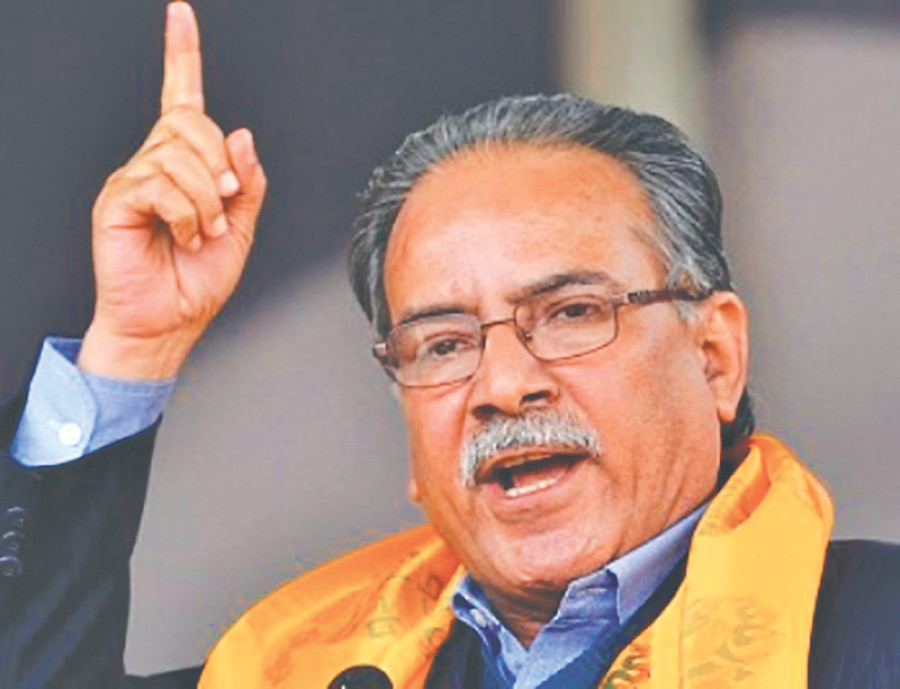Opinion
A lot on his plate
Prime Minister Dahal will need to focus on multiple fronts with a sincere intent
Madan Shahi
The Nepali Congress (NC) and the CPN-UML have participated in the 21 ruling coalitions out of the 23 governments formed during the 26 years of multiparty democracy beginning in 1990. But during most of the insurgency period, the people’s government under the Communist Party of Nepal (Maoist) controlled more than 80 percent of the territory of the Nepali state. After Jana Andolan II and the end of the conflict, the Maoists formed three governments under their leadership. Since then, the party has gone through a series of breakups, and it is only recently that the major splinter groups have united under the banner of the CPN (Maoist Centre).
Alignments and realignments have been major political tools used for government formation in Nepal, and breakups of political parties due to the vested interest of political leaders have become a culture in Nepali politics under the multiparty system.The great shock of the thumping defeat the UCPN (Maoist) received in the 2013 elections has taught it some lessons. Regretting his resignation during his first stint as prime minister, Pushpa Kamal Dahal, aka Prachanda, is now desperate to show his leadership through active engagement in constructing a socialist society—the type of society that he dreamt of when he was an insurgent.
One year has passed since the devastating earthquake, but none of the Nepali governments has been able to start the reconstruction work despite having adequate funds thanks to generous donors. Similarly, months have passed since the Indian blockade was lifted. Yet, the market has not been brought to a level of normal functioning. Meanwhile, regular calamities, socio-economic problems and corruption have paralysed the country’s growth and worsened living conditions.
Therefore, effective public and foreign policies rather than an obsession with political ideology are needed for Prachanda’s dream of social democracy to be fulfilled. In addition, willpower and effective leadership are other vital factors. Whether the government possess these capabilities is difficult to ascertain, partly because it was formed with the precarious support of the NC, a party with double the number of legislators than the Maoists. Moreover, the longevity of such coalitions, if history is a reminder, has been difficult to predict and futile to judge.
Social, cultural, economic
In order to create a lasting impact and legacy, the new prime minister will need to focus on multiple fronts with a sincere intent. In the social realm, possible expectations of the people will be eradication of inequalities in social status based on caste and ethnicity, and distribution of public resources based on equity. In the cultural aspect, preservation of the culture of indigenous peoples while initiating steps towards national integration based on multicultural and pluralistic nationalism will go a long way in easing tensions and promoting harmony.
On the economic front, effective policies must be made to benefit from the global shift in economic activities towards Asia and the rise of China and India as leading Asian economic powers. Reforms in trade and investment laws need to be accorded priority. Efforts to promote investment by improving the investment climate, especially in labour intensive industries and businesses, will create more jobs for the poor. In the education sector, policies should be made to maximise the opportunities of education for all. Moreover, maximisation of skill-driven technical education to produce human resources in demand domestically and abroad will improve real income levels. English should be made compulsory from the primary school level in order to make our human resources competitive in a globalised world.
Words, speeches and lies
Likewise, a proactive foreign policy should be followed and diplomatic relations established with a maximum number of countries besides forming affiliation with international regimes and organisations. This will not only provide leverage among the international community but also help in the growth of trade and investment, especially in the tourism sector. Widespread corruption and procrastination have been the greatest hindrance to the country’s development. Transparency should be maintained in government service delivery mechanisms, and corruption should be minimised as far as possible.
Stability in governance has always been disturbed due to frequent regime changes through lobbying and formation of new alignments between political parties. A recurrence of this pattern will mean that the Prachanda government will find it difficult to work in a coalition set-up, and it may face threats from within. He will need to garner sustainable consensus of all the political parties based on realistic grounds without harming core responsibilities. The attachment of political interests with the government is a common fact in a multiparty system, but any activities related to the self-interest of political leaders must be forbidden.
The government must first put homeless earthquake victims under secure roofs and start the reconstruction work. After that, it should respond to other emergencies by providing relief to citizens affected by landslides and floods. It will also need to move forward development projects, especially infrastructure projects, like the construction of roads which are the lifeline for the country’s sustainable development. After all, the most important requirement for effective leadership is the ability to manage and mitigate all kinds of threats without affecting the government’s goals. To do this, the government should not rely totally on outdated bureaucrats and conservatives who have already led the country towards being a failed state.
Though the Prachanda administration may not be able to put forward and succeed in meeting all these objectives, it should at least make viable policies and initiate reforms. This is the one and only way to revive the Maoists’ history. Words, speeches and lies will no more be able to win the hearts of the poor.
Shahi has a master’s degree in International Affairs from the Jindal School of International Affairs, Sonipat, India




 14.24°C Kathmandu
14.24°C Kathmandu











